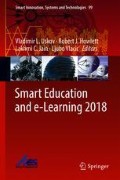Abstract
EASEL (education through application-supported experiential learning) is a platform designed to provide just-in-time content and reflection opportunities to students during field experiences, such as interviews or field labs, conducted as part of the workload in a course. This study was conducted in area of family medicine education at Indiana University-Purdue University Indianapolis. EASEL allows instructors and students flexibility to engage with course content based on the time of day and the location of each student conducting field work by providing access to questions and content before, during, and after a targeted field experience. In this study, three cohorts of family medicine students (N = 20) interviewed either a health care professional or a patient. Students used EASEL to facilitate and support their experience in the field. This study examined the student perceptions of EASEL. The data indicated instructive information on the usability of the EASEL platform and aided developers in considering future technologies to use as a part of the platform.
Access this chapter
Tax calculation will be finalised at checkout
Purchases are for personal use only
References
Association for Experiential Education. http://www.aee.org/what-is-ee. Accessed 23 Dec 2016
Nutter, D., Whitcomb, M.: The AAMC Project on the Clinical Education of Medical Students. Association of American Medical Colleges, Washington, DC (2001)
Kolb, D.A.: Experiential Learning: Experience as the Source of Learning and Development. Prentice-Hall, Englewood Cliffs (1984)
Kolb, A.Y., Kolb, D.A.: The learning way: meta-cognitive aspects of experiential learning. Simul. Gaming 40(3), 297–327 (2009)
Yardley, S., Teunissen, P.W., Dornan, T.: Experiential learning: transforming theory into practice. Med. Teach. 34(2), 161–164 (2012). https://doi.org/10.3109/0142159X.2012.643264
Lin, S.Y., Schillinger, E., Irby, D.M.: Value-added medical education: engaging future doctors to transform health care delivery today. J. General Intern. Med. 30(2), 150–151 (2015). https://doi.org/10.1007/s11606-014-3018-3
Allodola, V.F.: The effects of educational models based on experiential learning in Medical Education: an international literature review. Tutor 14(1), 23–49 (2014). https://doi.org/10.14601/Tutor-14725
Lewin, L.O., Robert, N.J., Raczek, J., Carraccio, C., Hicks, P.J.: An online evidence based medicine exercise prompts reflection in third year medical students. BMC Med. Educ. 14(164), 1–7 (2014). https://doi.org/10.1186/1472-6920-14-164
Nahum-Shani, I., Hekler, E.B., Spruijt-Metz, D.: Building health behavior models to guide the development of just-in-time adaptive interventions: a pragmatic framework. Health Psychol. 34(Supplement), 1209–1219 (2015)
Nahum-Shani, I., Smith, S.N., Spring, B.J., Collins, L.M., Witkiewitz, K., Tewari, A., Murphy, S.A.: Just-in-time adaptive interventions (JITAIs) in mobile health: key components and design principles for ongoing health behavior support. Ann. Behav. Med. (2016). https://doi.org/10.1007/s12160-016-9830-8
Gómez, S., Zervas, P., Sampson, D.G., Fabregat, R.: Context-aware adaptive and personalized mobile learning delivery supported by UoLmP. J. King Saud Univ. Comput. Inf. Sci. 26(1), 47–61 (2014)
Fakeeh, K.A.: Mobile-learning realization and its application in academia. Int. J. Comput. Appl. 133(17), 8–16 (2016)
Subramanian, V., Rajkumar, R.: Investigation on adaptive context-aware m-learning system for teaching and learning basic Hindi language. Indian J. Sci. Technol. 9(3), 1–8 (2016)
Leinonen, T., Keune, A., Veermans, M., Toikkanen, T.: Mobile apps for reflection in learning: a design research in K-12 education. Br. J. Edu. Technol. 47(1), 184–202 (2016)
Novak, G.M.: Just-in-time teaching. New Dir. Teach. Learn. 2011(128), 63–73 (2011)
Simkins, S., Maier, M.: Using Pedagogical Change to Improve Student Learning in the Economics Major, Chapters. In: Educating Economists, chapter 8 Edward Elgar Publishing (2009)
Ng, S., Kinsella, E., Friesen, F., Hodges, B.: Reclaiming a theoretical orientation to reflection in medical education research: a critical narrative. Med. Educ. 49, 461–475 (2015)
Sandars, J.: The use of reflection in medical education: AMEE Guide No. 44. Med. Teach. 31, 685–695 (2009)
Schnepp, J.C., Rogers, C.: Evaluating the Acceptability and Usability of EASEL: A Mobile Application that Supports Guided Reflection for Experiential Learning Activities (2017). Jite.org
Aronson, L., Niehaus, B., Hill-Sakurai, L., Lai, C., O’Sullivan, P.: A comparison of two methods of teaching reflective ability in Year 3 medical students. Med. Educ. 46, 807–814 (2012). https://doi.org/10.1111/j.1365-2923.2012.04299.x
Author information
Authors and Affiliations
Corresponding author
Editor information
Editors and Affiliations
Rights and permissions
Copyright information
© 2019 Springer International Publishing AG, part of Springer Nature
About this paper
Cite this paper
Rogers, C., Renguette, C., Cooper, S., Renshaw, S., Seig, M.T., Schnepp, J. (2019). Developing an Adaptive Mobile Platform in Family Medicine Field Experiences: User Perceptions. In: Uskov, V., Howlett, R., Jain, L., Vlacic, L. (eds) Smart Education and e-Learning 2018. KES SEEL-18 2018. Smart Innovation, Systems and Technologies, vol 99. Springer, Cham. https://doi.org/10.1007/978-3-319-92363-5_4
Download citation
DOI: https://doi.org/10.1007/978-3-319-92363-5_4
Published:
Publisher Name: Springer, Cham
Print ISBN: 978-3-319-92362-8
Online ISBN: 978-3-319-92363-5
eBook Packages: Intelligent Technologies and RoboticsIntelligent Technologies and Robotics (R0)

